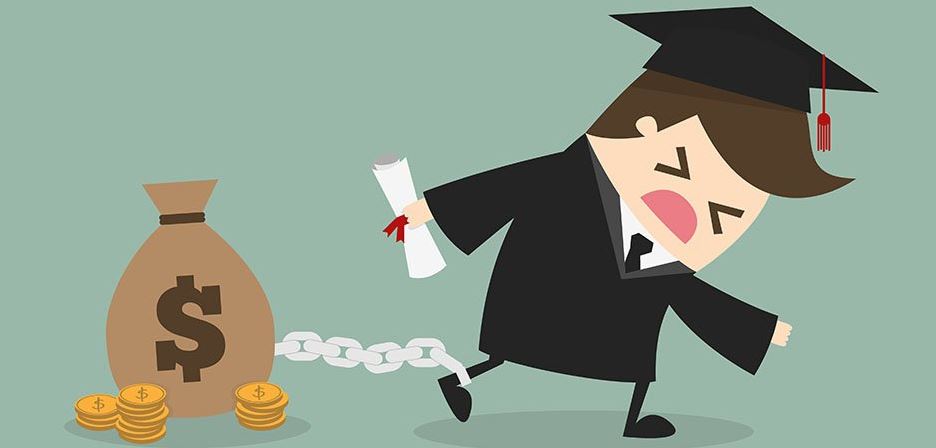Student loans can be a real hardship for some people. There are a number of things that can contribute to difficulty paying back student loans, such as low income, unemployment, or disability. If you are struggling to pay back your student loans, there are a number of things you can do to get help. You can contact your loan servicer or go through a bankruptcy petition to get your loans discharged.
Causes for Not Paying Back the Student Loans and Tips to Help
The following things contribute to the late payment or no payment of student loans:
High Cost of College
In the United States, college tuition is one of the most expensive items that students can purchase. In fact, the average cost of tuition, room, and board at a four-year institution has increased more than 178% since 1990. Moreover, In order to help offset the costs of attending college, many students turn to student loans to help finance their education.
Also, read- short term vs long term loans
Unfortunately, student loans are not always easy to come by. In fact, the competition for student loan funding is so fierce that only about one-third of all students who apply for student loans receive aid. This means that many students are left with student loans that are expensive, difficult to pay back, and may have restrictive repayment terms.
Tips:
Given the high cost of college and the challenging loan repayment landscape, it is important for students to be as prepared as possible for the financial challenges that will come with attending college. This means that students should work to create a budget and create a timeline for repayment so that they can comfortably handle the expenses associated with their education. In addition, students should make sure to investigate all of their options for student loan repayment, including options like private student loans and government student loans.
Stress of Loans
It can be hard to manage a loan when you’re struggling financially. For example, you may have to miss payments or take out a smaller loan to cover your expenses. As your loan debt increases, it can be hard to afford basic needs, like groceries or rent.
Read about- Grocery money saving apps
If you’re struggling to pay your loan, your lender may give you some extra hardship relief. This can include lowering your interest rate, extending your repayment schedule, or providing you with a loan forgiveness program.
Tips:
If you’re experiencing too much stress from your loan, don’t hesitate to reach out for help. There are professionals who can help you to manage your loan, and some programs provide direct assistance to borrowers.
Burden of Debt
There is no one answer to the question of how much debt is too much debt, as the amount of money that someone needs to borrow will vary depending on their individual circumstances. However, there are a few general points that are worth noting when discussing student loan debt.
Firstly, student loan debt can have a serious impact on someone’s credit score. This can make it difficult to obtain loans in the future, and can also lead to higher interest rates on other types of loans.
Useful guide- How to apply for short term loan
secondly, student loan debt can lead to economic hardship. This is because, while student loan debt is not always immediately payable, the interest that is added to the loans can accumulate quickly and be very expensive. This can lead to a situation in which someone is unable to live comfortably due to the high amount of debt that they have accrued.
Finally, student loan debt can have a negative effect on a person’s future opportunities. This is because, as student loan debt accumulates, it can become more difficult to find a job that offers appropriate pay.
Tips:
Loan consolidation can help to reduce the amount of debt that someone owes. However, it is important to be aware of the risks associated with student loan debt and to ensure that you are making the best possible decision for your individual circumstances.
More Tips to Ease Difficulty of Repayment
Student loans are a serious responsibility. They take a long time to repay, and they can seriously impact your future. That’s why I want to offer some advice on how to make repayment easier.
Read about- Christmas loan with bad credit
First of all, it’s important to understand that student loans are not easy to pay back. They’re expensive, and they take a long time to repay. That’s why it’s important to make a plan and stick to it.
1. Make a plan
First and foremost, make a plan. Figure out what you need to do to repay your student loans. This will help you stay organized and on track.
2. Keep track of your expenses
If you can, keep track of your expenses. This will help you figure out how much money you need to repay each month.
3. Consolidate your loans
If you can, Consolidate your loans. This will make repayment easier.
4. Use a repayment plan
If you can, use a repayment plan. This will make repayment easier and more affordable.
5. Ask for help
If you’re struggling to repay your student loans, don’t be afraid to ask for help. There are lots of resources available
Conclusion
Students have to endure hardships when they have to take out student loans. They have to work hard and make sacrifices in order to pay back the loans. It can be difficult to make ends meet while taking on these debts, and sometimes there are unexpected expenses that crop up. This can make it difficult to stay on track with the repayment schedule. However, with a little effort, students can manage to get through these tough times and eventually pay off their loans.
